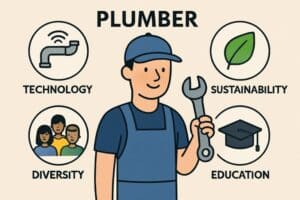Introduction
The world of plumbing is evolving at a rapid pace, driven by advancements in technology, a growing focus on sustainability, and the changing dynamics of the modern workforce. These factors are redefining what it means to be a professional plumber and creating both new opportunities and challenges for those entering or already working in the trade. If you’re interested in staying at the forefront of the industry and gaining the skills necessary for future success, you can learn more about state-of-the-art training programs designed to meet these new demands.
Emerging trends in the plumbing industry, such as smart technology integration and eco-friendly solutions, emphasize the need for ongoing training, adaptability, and a commitment to excellence to ensure long-term success and job satisfaction.
Technological Advancements
The influx of modern technology is revolutionizing the plumbing industry on multiple fronts. Smart plumbing systems that utilize Internet of Things (IoT) sensors, advanced water monitoring tools, and automated leak detection are becoming increasingly common in both residential and commercial settings. These innovations allow for real-time data collection, efficient water management, and immediate responses to potential problems, saving time, money, and resources.
In addition to these systems, diagnostic tools such as high-resolution video inspection cameras enable plumbers to detect and locate blockages or damage with pinpoint accuracy. Trenchless technology is another advancement, allowing repairs and replacements to be made with minimal disruption to landscapes and structures. Embracing these tools helps plumbers deliver better service with greater efficiency and less environmental impact.
Sustainability and Eco-Friendly Practices
Environmental sustainability is now a predominant theme across all construction and building maintenance fields, and plumbing is no exception. Homeowners, businesses, and governments are seeking solutions that reduce water waste, lower energy consumption, and minimize the carbon footprint associated with water delivery and waste management systems. The use of low-flow fixtures, dual-flush toilets, and highly efficient water heaters is becoming standard in new installations.
Greywater recycling, rainwater harvesting systems, and environmentally safe materials are in high demand, aligning with regulatory pushes for greener infrastructure. Plumbers skilled in sustainable solutions are poised to lead the market. These eco-friendly practices not only reduce operating costs for clients but also help meet growing compliance requirements, making green expertise a valuable career asset.
Workforce Diversity and Inclusion
The future of plumbing careers is also shaped by a richer and more diverse workforce. Historically, plumbing was male-dominated, but increasing outreach efforts are expanding opportunities for women and other underrepresented groups. Diversity and inclusion initiatives are not just about fairness, as they drive innovation by bringing broader perspectives and creative problem-solving approaches to the table.
Organizations across the industry are offering mentorship programs, scholarships, and marketing campaigns aimed at breaking down barriers and challenging stereotypes. This focus on inclusion is helping to build a resilient workforce better equipped to meet the needs of diverse customers and changing communities.
Economic and Regulatory Factors
The economic pulse of the plumbing industry is closely tied to construction booms, urban expansion, and the ongoing need to address aging infrastructure. These trends predict a steady demand for plumbers, especially those with up-to-date technical skills. However, this prosperity comes with a complex web of regulations focused on water efficiency, lead abatement, and energy conservation.
Every plumbing project, from new construction to renovations, must conform to a growing list of standards and best practices. Understanding and adapting to shifting regulations ensures that plumbers retain their professional credibility and avoid costly penalties, while also safeguarding public health and the environment.



